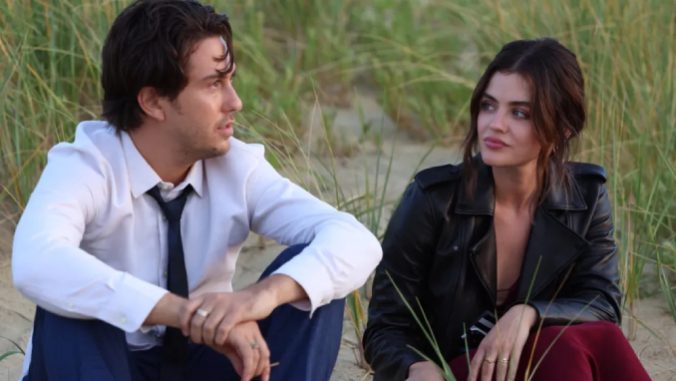Which Brings Me to You Is a Frustrating Waste of an Interesting Rom-Com Premise

Rom-com directors, I beg of you: Let go of your obsession with using the sacred needledrop of “It Had to Be You.” Director Rob Reiner found its perfect placement in When Harry Met Sally, essentially rendering the song out of play in subsequent rom-coms, because who can best that very high bar? And if you do half-ass the use of the song, you will be judged for it. I’m looking at you, Which Brings Me to You director Peter Hutchings.
An adaptation of the 2006 novel of the same name by Julianna Baggott and Steve Almond, Which Brings Me to You stars Lucy Hale as Jane and Nat Wolff as Will, two apathetic guests invited to a New Jersey seaside wedding. The only thing that interests them is one another. So, even before the hors d’oeuvres have made the rounds, Jane propositions Will to a quickie in the coat room. He enthusiastically accepts, then promptly pours cold water on the vibe by suggesting they talk instead. Despite that humiliating rejection, he somehow manages to get Jane to continue speaking with him, sober up and then reluctantly share with him her worst heartbreaks. And thus, the cobwebs of their failed romances are dusted off to become the anecdotal spine of this “unconventional” meet-cute rom-com.
Screenwriter Keith Bunin (Onward) and director Hutchings erase the epistolary format of the book—which had the authors, as the characters, sharing their past love lives in letters over a span of time—and instead compress their couple’s tales of woe into a 24-hour period. In theory, that seems like a smart call to accelerate their chemistry, but that only works if there’s some heat between the leads. While Hale and Wolff have separately done strong work in prior romance films, including Hale and Hutchings’ prior winner, The Hating Game, they can’t spark any sizzle here.
That said, Hale is still the MVP for knowing what works in this genre and striving for it throughout. It’s Wolff who seems a bit adrift, not hitting the needed breezy charm that would make us understand what Jane sees in him, and then fall for them being together. Will is too dire throughout, so much so that even his slutty “artist in New York” phase doesn’t come across as carefree or much fun. He may be the instigator with this experiment in soul-sharing, but the script shortchanges him with opportunities to really like him.
-

-

-

-

-

-

-

-

-

-

-

-

-

-

-

-

-

-

-

-

-

-

-

-

-

-

-

-

-

-

-

-

-

-

-

-

-

-

-

-








































